

American Speech-Language-Hearing Association ASHA. ASHA Marketing Solutions. ASHA ProFind - Communication help near you.
ASHA Leader Articles. How To Be a Critical Consumer of Treatment Studies. ASHA: Pragmatic Language Tips. Pragmatic Language Tips There are several ways parents and teachers can help children use language appropriately in social situations.
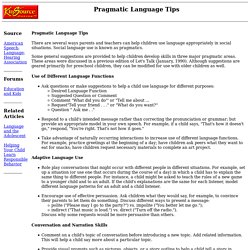
Social language use is known as pragmatics. Some general suggestions are provided to help children develop skills in three major pragmatic areas. These areas were discussed in a previous edition of Let's Talk (January, 1990). Although suggestions are geared primarily for preschool children, they can be modified for use with older children as well. Use of Different Language Functions Ask questions or make suggestions to help a child use language for different purposes: Desired Language Function Suggested Question or Comment Comment "What did you do"' or "Tell me about ...
Adaptive Language Use Role play conversations that might occur with different people in different situations. Conversation and Narration Skills Comment on a child's topic of conversation before introducing a new topic. Back to top. Auditory Integration Training. Position Statement Working Group in AIT About this Document This position statement is an official policy of the American Speech-Language-Hearing Association (ASHA).
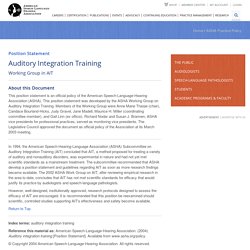
This position statement was developed by the ASHA Working Group on Auditory Integration Training. Members of the Working Group were Anne Marie Tharpe (chair), Candace Bourland-Hicks, Judy Gravel, Jane Madell, Maurice H. In 1994, the American Speech-Hearing-Language Association (ASHA) Subcommittee on Auditory Integration Training (AIT) concluded that AIT, a method proposed for treating a variety of auditory and nonauditory disorders, was experimental in nature and had not yet met scientific standards as a mainstream treatment.
However, well-designed, institutionally approved, research protocols designed to assess the efficacy of AIT are encouraged. Return to Top. Auditory Integration Training. Technical Report Working Group in AIT About this Document: This technical report was prepared by the American Speech-Language-Hearing Association (ASHA) Working Group on Auditory Integration Training and was adopted by the ASHA Executive Board in March 2003.
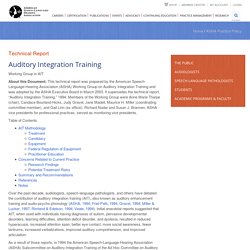
It supersedes the technical report, “Auditory Integration Training,” 1994. Auditory Processing Disorders (APD) in Children. By Teri James Bellis, PhD, CCC-A In recent years, there has been a dramatic upsurge in professional and public awareness of Auditory Processing Disorders (APD), also referred to as Central Auditory Processing Disorders (CAPD).
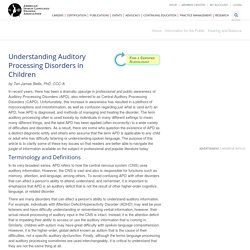
Unfortunately, this increase in awareness has resulted in a plethora of misconceptions and misinformation, as well as confusion regarding just what is (and isn't) an APD, how APD is diagnosed, and methods of managing and treating the disorder. The term auditory processing often is used loosely by individuals in many different settings to mean many different things, and the label APD has been applied (often incorrectly) to a wide variety of difficulties and disorders.
As a result, there are some who question the existence of APD as a distinct diagnostic entity and others who assume that the term APD is applicable to any child or adult who has difficulty listening or understanding spoken language. Terminology and Definitions. Billing Edits for Auditory Processing Disorder In Effect April 1, 2012. (Central) Auditory Processing Disorders.
Working Group on Auditory Processing Disorders About this Document This technical report was developed by the American Speech-Language-Hearing Association (ASHA) Working Group on Auditory Processing Disorders.
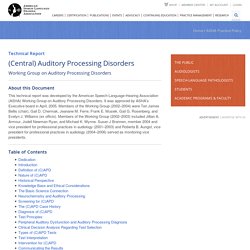
It was approved by ASHA's Executive board in April, 2005. Members of the Working Group (2002–2004) were Teri James Bellis (chair), Gail D. Chermak, Jeanane M. Dedication In loving memory of our dear friend and colleague Michael K. Return to Top Introduction. Childhood Apraxia of Speech. Ad Hoc Committee on Apraxia of Speech in Children About this Document This technical report was developed by the American Speech-Language-Hearing Association (ASHA) Ad Hoc Committee on Apraxia of Speech in Children.
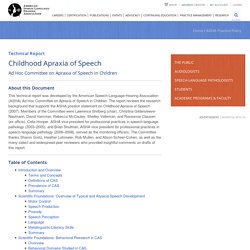
The report reviews the research background that supports the ASHA position statement on Childhood Apraxia of Speech (2007). Members of the Committee were Lawrence Shriberg (chair), Christina Gildersleeve-Neumann, David Hammer, Rebecca McCauley, Shelley Velleman, and Roseanne Clausen (ex officio). Find a Professional: Online Directory of Audiology and Speech-Language Pathology Programs. Managing Meltdowns: Some students with autism, overwhelmed with frustration and anxiety, refuse to cooperate. In a recent online conference, autism expert Jed Baker provided tips to help SLPs manage emotions, defuse student crises and set up prevention pl. Publications of the American Speech-Language-Hearing Association (ASHA) Search ASHA Web sites, Journals, Perspectives, Products, and Convention Materials. The Powered-Up Parent: Research tells us that parents are key to successful treatment with preschoolers who stutter. But current school practices and ingrained attitudes can make this participation challenging. Here’s what you can do.
User Alerts You are adding an alert for: The Powered-Up ParentResearch tells us that parents are key to successful treatment with preschoolers who stutter.
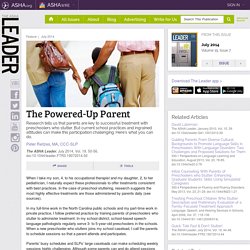
But current school practices and ingrained attitudes can make this participation challenging. Here’s what you can do. You will receive an email whenever this article is corrected, updated, or cited in the literature. The alert will be sent to: American Speech-Language-Hearing Association.(2012). 2012 Schools survey. Brisk, D., Healey, E. Bloodstein, O., & Bernstein Ratner, N. (2008) A handbook on stuttering (6th ed.)
Conture, E.